STAN SHEA
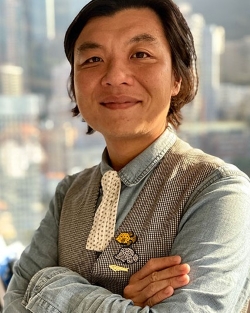
Stan Shea is the Marine Programme Director at BLOOM Association Hong Kong and ADM Capital Foundation. He spearheads research projects addressing holes in knowledge of the dried seafood trade and local marine biodiversity, providing critical information to inform efforts for the conservation of marine resources and habitats.
His research can be found in several report publications and peer-reviewed journals, on topics including global trade dynamics and retail market status for shark fins, sea cucumbers, and related dried seafood products, Hong Kong wet market surveys on live reef food fish, and discoveries of new reef fish species records for Hong Kong. He is a National Geographic Explorer and a 2023 Pew Marine Fellow 2023.
DIEGO CARDEÑOSA
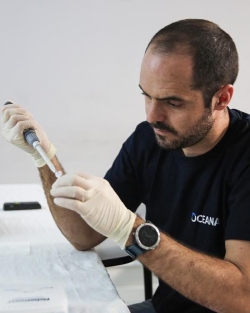
Dr. Diego Cardeñosa is an Assistant Professor in the Department of Biological Sciences at Florida International University, where his research focuses on addressing illegal wildlife trade and improving conservation outcomes for sharks and rays globally. His work has been pivotal in determining the species composition of the international shark trade, tracing the geographic origins of shark and ray products, and developing innovative, rapid DNA protocols for use by enforcement officers in major wildlife trade hubs. These efforts have directly informed the inclusion of numerous shark and ray species in CITES listings, significantly shaping international wildlife trade policies and contributing to global conservation strategies.
Dr. Cardeñosa has partnered extensively with INTERPOL and national enforcement agencies in countries including Peru, Ecuador, Costa Rica, Panama, Brazil, Spain, Colombia, and Hong Kong, where he co-leads the largest shark fin market survey. Additionally, his field-based initiatives incorporate telemetry, environmental DNA (eDNA), and Baited Remote Underwater Video (BRUV) surveys to monitor shark and ray populations, providing critical data for sustainable fisheries management and marine protection programs.
His contributions to marine conservation have been widely recognised, including by The Explorers Club’s EC50 program and the Blue Marine Foundation’s Award for Innovation. At Sharks International 2026, Diego will share insights from his work, highlighting innovative approaches to conservation, policy impact, and enforcement of wildlife trade regulations.
GHOFRANE LABYEDH
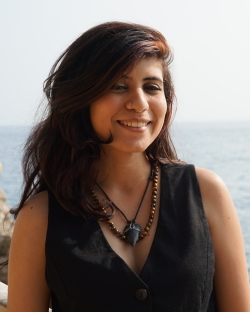
Ghofrane Labyedh is an aquatic biologist and ocean conservationist with a master’s degree in aquatic biodiversity and ecosystems. Her passion for marine life began on the shores of Monastir, Tunisia, where she volunteered to monitor sea turtles on what became the Kuriat Islands Marine Protected Area. This experience inspired her dedication to ocean conservation.
Since 2019, she has worked in Cameroon with the African Marine Conservation Organisation (AMCO), focusing on sharks and rays. She became the Shark and Ray Program Manager in 2022, leading fish market surveys, socio-economic studies with fishing communities, volunteer training, and policy advocacy. She translates research into reports and policy briefs to guide decision-making and secure conservation funding. She coordinates the West/Central Africa Elasmobranch Coalition with the Manta Trust, bridging gaps in research, skills, and policy across the region. In 2024, she became a National Geographic Explorer, launching a live-release program that empowers fishers as conservation partners.
Recently, she became a fellow of the Sustainable Ocean Alliance (SOA) and Nature, Environment, Wildlife Filmmaking (NEWF), working to combine science and storytelling to inspire action. With over a decade of marine conservation experience, her vision is to integrate fisher knowledge with science and build regional collaboration for sustainable ocean conservation along Africa’s coasts.
GUIDO LEURS
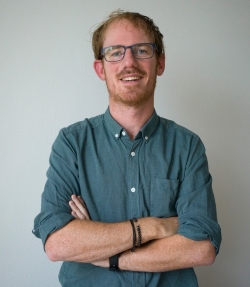
Dr. Guido Leurs is a postdoctoral researcher at Wageningen University & Research (the Netherlands), specialising in the ecology and conservation of sharks and rays. His work explores the ecological roles of elasmobranchs across a variety of ecosystems—including large intertidal zones, coral reefs, and temperate coastal waters – and anthropogenic impacts.
He holds a PhD. from the University of Groningen (the Netherlands), for which he studied the importance of large intertidal areas to sharks and rays, and how fisheries in these areas may impact the global connectivity of ecosystems. He currently works with partner organisations and local researchers in West Africa to implement monitoring programs of small-scale fisheries and studies the overlap of these fisheries with shark and ray movements within important coastal areas.
In addition, over the past years, he has studied the movement and trophic ecology of reef-associated sharks in the Dutch Caribbean and now works with colleagues to research sharks and rays in the Dutch North Sea. Besides research, Guido also co-organises the annual Azores Shark & Ray Safari to educate divers about shark ecology, and gives lectures on marine and shark ecology at the university.
ZOYA TYABJI
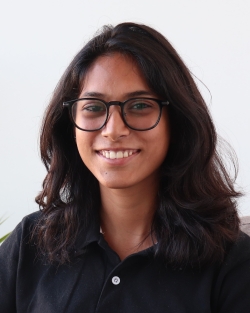
Zoya Tyabji is a marine ecologist and PhD candidate at Dalhousie University whose work bridges science, policy, and community engagement to conserve sharks and rays in South Asia. With extensive field research in the Andaman Islands, she combines biological data and stakeholder knowledge to understand and improve fisheries management.
Her research has helped document critical baselines for elasmobranch populations and trade, shaping regional conservation strategies. As a keynote speaker, Zoya brings a unique blend of scientific rigour, community engagement, and passionate storytelling, offering fresh insights into inclusive marine conservation in one of the world’s most biodiverse and threatened seascapes.
BARBARA WUERINGER
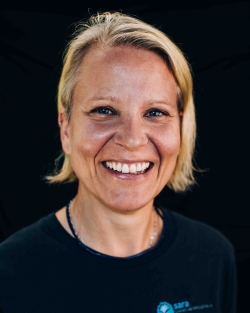
Barbara is the founder, director and lead scientist of Sharks And Rays Australia (SARA). Originally from Austria, she first fell in love with sharks when she volunteered at the Bimini Biological Field Station, Bahamas. For her Master’s degree, she worked on the sensory biology of two species of shovelnose ray. She continued to work with shark-like rays, and was awarded a PhD from the University of Queensland, for a project on the sensory ecology and feeding behaviour of freshwater elasmobranchs of northern Queensland, Australia, including sawfish, speartooth sharks and freshwater whiprays.
Barbara has worked with people from all walks of life, including industry, fisheries, and politicians. Her work in the remote riverine and coastal ecosystems of Far North Queensland and the Cape York Peninsula led her to found Sharks And Rays Australia, an organisation that combines research with outreach to achieve conservation outcomes for sawfishes. Under Barbara’s lead, SARA collaborates widely with Aboriginal Traditional Land Owners and their ranger groups. These collaborations have enabled the establishment of long-term research and monitoring programs for sawfishes and other sharks and rays, many of which are culturally significant to many Aboriginal groups. She holds an Honorary Position at Macquarie University.
GUY STEVENS
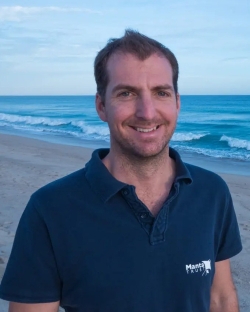
Dr. Guy Stevens is the Chief Executive and Founder of the Manta Trust, a UK-registered charity dedicated to the conservation of manta and devil rays, with collaborative projects in over 25 countries. Guy has spent the last two decades studying manta and devil rays all over the world and is one of the foremost experts on these species.
After completing a degree in Marine Biology and Coastal Ecology at the University of Plymouth in the UK, Guy moved to the Maldives, where he founded the Maldives Manta Conservation Programme in 2005. Studying for his PhD at the University of York, Guy completed his doctoral thesis on the world’s largest population of reef manta rays at the end of 2016.
Guy's conservation efforts in the Maldives have led to the creation of several marine protected areas, while internationally, he is part of a team which has driven the conservation of mobulids forward, resulting in the listing of all manta and devil rays on the Appendices of CMS and CITES. For his contribution to ocean conservation, in 2015, Guy received an Ocean Award for his work on manta rays, and in 2017, he was awarded the UK Prime Minister's Points of Light Award. Guy is the author of three books and over fifty scientific articles on mobulid rays.
MARTA D PALACIOS
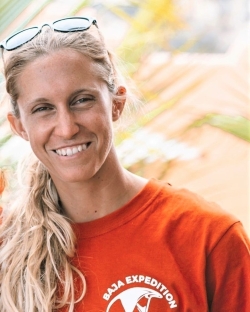
Dr. Marta D. Palacios is a marine biologist and co-founder of Mobula Conservation. She specialises in the ecology, conservation, and fisheries interactions of mobulid rays in the Mexican Pacific. She holds a PhD from CICIMAR-IPN (Mexico), in collaboration with the University of California, Santa Cruz. Marta has worked extensively with artisanal fishers, NGOs, and government agencies to bridge science and policy, contributing to the identification of critical habitats for mobulids and the development of management plans and potential bycatch mitigation strategies in small-scale fisheries in Mexico.
She is currently part of the Important Shark and Ray Areas (ISRA) project, supporting the identification of critical habitats for chondrichthyans around the world. As a collaborator with the Manta Trust, Marta led a global assessment of the trade in mobulid meat and gill plates, contributing to the proposal to uplist mobulids to CITES Appendix I.
Marta is a grantee of The Explorers Club, the Shark Conservation Fund, and the Walter Munk Foundation.
RAFID SHIDQI
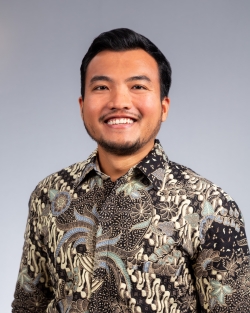
Rafid is the Co-Founder of Thresher Shark Indonesia, a youth-led NGO based on Alor Island, Indonesia. He has been a key member of the organisation since its founding in 2018. Rafid is an interdisciplinary scientist with a strong interest in the ecology of sharks and rays and has developed a passion for finding ways to balance conservation efforts with the livelihoods of coastal communities in Indonesia that depend on endangered sharks.
He manages the growth and operations of Thresher Shark Indonesia, building and maintaining relationships with partners, communities, donors, and private entities. Under his leadership, Thresher Shark Indonesia has expanded its operations beyond Alor Island to the Banda Archipelago and East Flores, employing more than 25 young people in these regions.
Rafid earned a Master of Science in Coastal Science and Policy from the University of California, Santa Cruz, and is currently working towards a PhD in the Marine Science and Conservation program at Duke University's Nicholas School of the Environment, USA.
SARAH FOWLER
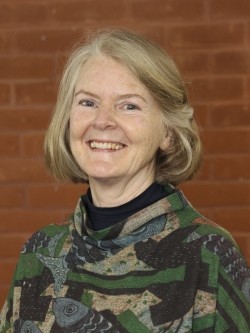
Sarah has worked in marine biodiversity conservation for over 45 years, for government agencies, national and international non-governmental organisations (NGOs & IGOs), and in the private sector. Appointed in 1990, Sarah is the longest-serving IUCN SSC Shark Specialist Group (SSG) member. During 18 years as SSG Deputy Chair, Chair and Co-Chair, Sarah led the first global chondrichthyan IUCN Red List Assessment and Status Report and became engaged with the work of international treaties (multilateral environmental agreements – MEAs) regarding the conservation and management of sharks and rays.
These include the Convention on International Trade in Endangered Species (CITES), the Convention on the Conservation of Migratory Species (CMS), the Food and Agriculture Organization (FAO), and the Barcelona Convention, including the development of the CMS Sharks MOU, the FAO IPOA–Sharks, and the first Action Plan for the Conservation of Cartilaginous Fishes (Chondrichthyans) in the Mediterranean.
Sarah co-founded the European Elasmobranch Association and UK Shark Trust during the mid-1990s, and was awarded the Order of the British Empire for services to marine conservation in 2005. She has been a scientific advisor to the Save Our Seas Foundation for 15 years and is co-author of several editions of Sharks of the World published since 2005.